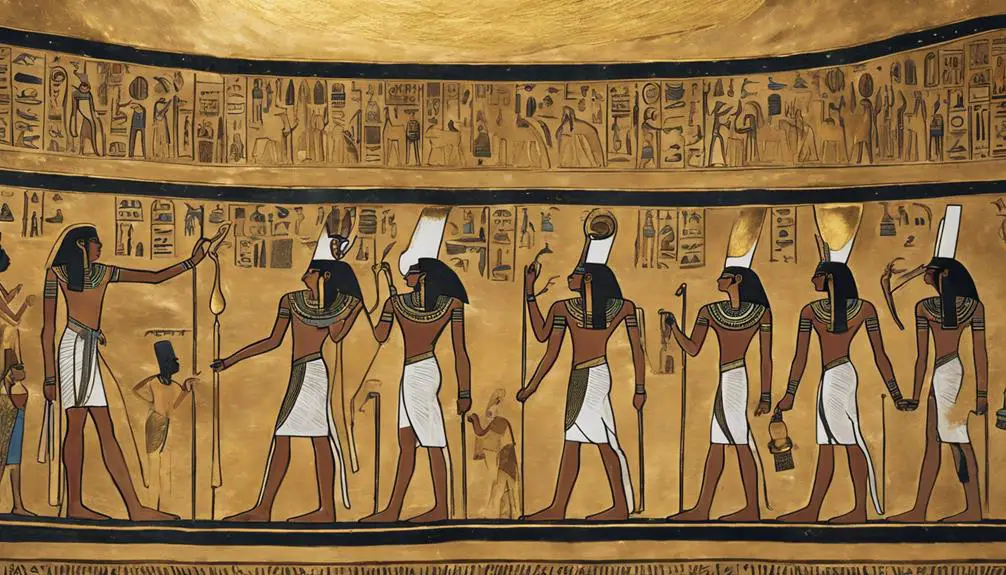A journey through biblical narratives reveals timeless lessons on wealth transfer, inviting readers to explore its divine and strategic dimensions.

Wealth Transfer in the Bible
Have you ever wondered if the concept of wealth transfer is as old as the stories in the Bible? The narratives from Abraham's divine wealth to Solomon's unparalleled riches paint a vivid picture of this phenomenon, showcasing moments where prosperity seems to shift hands in both miraculous and strategic ways.
You'll find that these accounts aren't just ancient history; they might hold relevant insights for understanding wealth dynamics today. As we explore these biblical events, consider how they mirror or differ from modern perspectives on wealth accumulation and distribution, setting the stage for a rich discussion on the timeless interplay between divine providence and human stewardship.
Key Takeaways
- Wealth transfer in biblical narratives often signifies divine intervention and fulfillment of promises.
- Economic impacts, like the plunder of Egypt, demonstrate the tangible outcomes of divine actions.
- Miracles of provision, such as the multiplication of oil, symbolize divine care and sustenance.
- The management and distribution of wealth serve both divine purposes and community care, as seen in temple contributions and care for the vulnerable.
Abraham's Divine Wealth

Abraham's acquisition of wealth, as narrated in the Bible, stands as a seminal instance of divine intervention in human prosperity, highlighting the intertwining of faith and material blessing. This narrative isn't merely about riches; it's a profound exploration of covenant promises and their manifestation. Through Abraham's journey, you witness a blueprint of nomadic prosperity, underpinned by unwavering faith in divine promises.
Delving deeper, the covenant between Abraham and God isn't solely spiritual but encompasses material wealth as a sign of God's blessing. This covenant underscores a mutual commitment, where Abraham's faith triggers divine action, including the provision of wealth. It's a pivotal lesson on how faith and obedience are rewarded by tangible blessings, setting a precedent for future generations.
Moreover, Abraham's nomadic lifestyle, often perceived as a hindrance to accumulating wealth, paradoxically becomes a conduit for prosperity. This challenges contemporary notions of wealth acquisition, suggesting that divine provision transcends human circumstances. Abraham's story, thus, serves not only as historical narrative but as a theological discourse on the dynamics of faith, obedience, and divine blessing in the pursuit of prosperity.
Joseph's Rise to Power
While Abraham's story underscores the role of faith in acquiring wealth, Joseph's ascent to power exemplifies how resilience and divine favor can elevate someone from the depths of despair to unparalleled heights of influence and prosperity. Joseph's journey, marked by trials, also highlights the pivotal role of dream interpretations and famine management in his rise. This narrative isn't just a tale of personal triumph but a larger commentary on divine orchestration and the rewards of faithfulness and wisdom.
Key elements in Joseph's rise include:
- Dream Interpretations: Joseph's ability to interpret dreams accurately won him Pharaoh's favor, showcasing the importance of unique talents and divine inspiration in achieving prominence.
- Famine Management: His strategic planning for the seven years of famine not only saved Egypt but also established him as a figure of immense power and wisdom.
- Resilience: Despite being sold into slavery and unjustly imprisoned, Joseph's unwavering faith and resilience propelled him towards his destiny.
- Divine Favor: Throughout his journey, Joseph's alignment with divine purpose facilitated his transition from a prisoner to the second most powerful man in Egypt.
This progression underlines the idea that wealth and influence can be divinely orchestrated, transcending human limitations and adversities.
The Plunder of Egypt

The plunder of Egypt, a pivotal event in biblical history, underscores the complex interplay of divine justice and human agency in redistributing wealth. This episode not only reflects God's justice but also significantly impacts the Egyptian economy, marking a decisive shift in the resources' distribution.
Aspect |
Impact on Egyptian Economy |
|---|---|
Gold and Silver |
Drained resources, weakened state |
Livestock |
Loss of agricultural productivity |
Textiles and Goods |
Depletion of trade commodities |
As you delve deeper into this narrative, you'll find the Israelites, under divine command, asking the Egyptians for silver, gold, and clothing. The Egyptians' compliance, driven partly by fear and divine influence, facilitated an unprecedented transfer of wealth. This wasn't merely an act of plunder but a fulfillment of God's promise to Abraham, showcasing a divine reparation for the Israelites' suffering.
This event's analysis reveals a multifaceted impact on the Egyptian economy. The loss of valuable metals and livestock diminished Egypt's economic power and agricultural productivity, while the depletion of textiles and other goods marked a significant downturn in trade capabilities. Here, the balance between God's justice and the economic ramifications offers a profound insight into the biblical narrative of wealth transfer.
Solomon's Unparalleled Riches
How did King Solomon amass wealth unparalleled in biblical history, and what does this signify in the broader context of divine blessing and economic strategy? Solomon's wisdom, often highlighted as his most defining trait, played a pivotal role in his economic achievements and the prosperity of his kingdom. His wealth wasn't just a measure of material success but also a testament to the divine favor and strategic alliances he cultivated.
Here are four key aspects that contributed to Solomon's extraordinary riches:
- Trade and Diplomacy: Solomon's wisdom enabled him to forge strategic alliances, expanding trade routes that brought gold, silver, and exotic goods into Israel, enriching the kingdom.
- Temple Contributions: His reign saw unprecedented contributions towards the Temple, symbolizing both spiritual devotion and economic prosperity.
- Administrative Acumen: Solomon's organizational skills led to efficient governance, increasing productivity and wealth accumulation.
- Divine Blessing: Beyond human strategy, Solomon's wealth was also seen as a direct blessing from God, rewarding his wisdom and faithfulness.
His unparalleled riches, therefore, weren't just a personal asset but served a larger divine and communal purpose, illustrating the intricate link between divine favor, wisdom, and economic strategy in biblical narratives.
The Widow's Oil Multiplied

Shifting our focus from the opulence of Solomon's reign, we encounter a contrasting narrative of divine provision in the story of the widow's oil multiplied, illustrating another facet of wealth transfer in biblical texts. This event isn't just a miraculous provision; it's a prophetic act symbolizing God's ability to provide abundantly in times of dire need. The miracle significance here is profound, showcasing a divine response to human desperation through unexpected means.
Element |
Symbolism |
Impact |
|---|---|---|
Widow |
Vulnerability |
God's care for the marginalized |
Oil |
Provision |
Sustenance and abundance |
Prophet |
Divine intermediary |
Channel of God's miracles |
Jars |
Capacity for blessing |
Unlimited potential for God's provision |
Debt |
Human plight |
Divine intervention and relief |
This story isn't merely about the multiplication of a physical resource; it's a testament to God's provision and care, transcending human limitations. The widow's act of faith, in collecting jars not knowing the outcome, and the subsequent overflow of oil, underscore the limitless nature of divine provision. Through this narrative, you're invited to see wealth transfer not as a mere accumulation but as a divine act ensuring survival and dignity for the marginalized.
Frequently Asked Questions
How Does the Concept of Wealth Transfer in the Bible Relate to Modern Financial Practices and Ethical Wealth Redistribution?
When you consider modern financial practices and ethical wealth redistribution, it's crucial to evaluate how investment strategies and avoiding tax evasion align with broader societal values.
These practices reflect not just personal gains but also a commitment to equitable wealth distribution. Reflecting on these principles helps you understand the underlying ethics in financial decisions, fostering a system where wealth transfer benefits the wider community, mirroring principles seen in historical texts.
In Instances of Wealth Transfer in the Bible, How Is the Morality of Wealth Acquisition and the Responsibility of the Wealthy Addressed?
You might think talking about wealth's morality and responsibility is outdated, but it's quite the opposite. Analyzing moral dilemmas surrounding wealth origins and its acquisition reveals much about societal values.
When considering how the responsibility of the wealthy is framed, it's clear that historical perspectives offer rich insights for today's discussions on ethical wealth redistribution.
This analysis not only enlightens but also challenges us to rethink our approach to wealth and its impact on society.
Are There Examples in the Bible Where Wealth Transfer Led to Negative Consequences or Was Seen as Unjust? How Are These Situations Resolved?
You'll find that instances of wealth transfer do lead to negative outcomes, including land disputes and inheritance conflicts. Analyzing such situations reveals a deeper understanding of justice and resolution.
For example, the story of Achan's theft and its aftermath showcases how justice is served. Similarly, inheritance disputes among siblings, such as Jacob and Esau, highlight the complexities of familial wealth distribution and the quest for equitable resolutions.
How Do Biblical Principles of Wealth Transfer Apply to the Concept of Charity and Helping the Less Fortunate in Contemporary Society?
You're exploring how principles of charitable giving and social justice, derived from biblical texts, guide contemporary acts of charity. These ancient mandates promote a redistribution of wealth to aid the less fortunate, emphasizing empathy and moral responsibility.
In today's society, applying these lessons encourages a more equitable distribution of resources, urging individuals and communities to support those in need through generous acts of kindness, thereby embodying the spirit of compassion and fairness at the heart of these teachings.
What Lessons Can Entrepreneurs and Business Leaders Learn From the Biblical Narratives of Wealth Transfer Regarding Stewardship and the Management of Resources?
As you navigate the labyrinth of entrepreneurship, remember, stewardship and resource management are your guiding stars.
Biblical narratives, stripped of their specific context, highlight a delicate dance between divine intervention and personal ambition. This balance teaches you to manage with foresight, acknowledging that your resources aren't just for personal gain but for a greater good.
Embrace these lessons, as they're crucial in molding a leader who's not just successful but also virtuous and wise.
Conclusion
In the tapestry of biblical narratives, the motif of divine wealth transfer emerges as a compelling thread, weaving through the lives of figures like Abraham, Joseph, and Solomon.
This celestial redistribution acts not merely as a testament to God's favor but as a mechanism for fulfilling divine promises and purposes. Through these storied accounts, one discerns a pattern where material wealth transcends mere possession, becoming a tool for divine providence.
Thus, the biblical portrayal of wealth transfer invites reflection on the intersection of faith, fortune, and divine intentionality.



Sign up